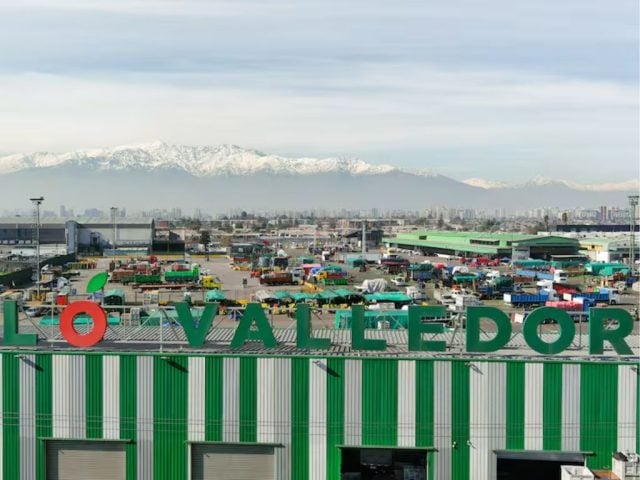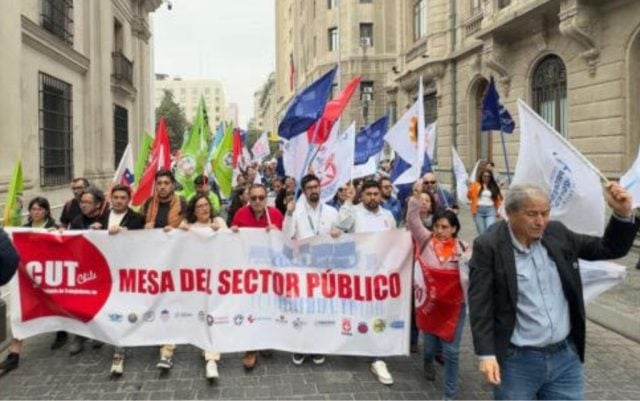Original article: Lo Valledor: sindicatos exigen fin de abusos de la administración y 50% menos en tarifas
The Federation of Unions representing workers and vendors at the Lo Valledor wholesale market has raised its voice to present a series of demands aimed at improving labor conditions and putting an end to the abuses associated with the management of the current administration, which has been in power since 1989. The demands include a 50% reduction in entry and commercialization fees, the resignation of the management board, and the establishment of a plural and democratic administration.
Jesús Fuentes, leader of the Juan Pablo II Union at Lo Valledor, highlighted to Radio Nuevo Mundo a series of issues within the megamarket that have driven the organization of workers and vendors. He accused the market’s management of imposing high fees for entry, commercialization, and leases on users and vendors.
The entry fee to the facility is set at $7,000 for smaller and empty vehicles, with increases based on load and sector. For instance, he explained that a car or truck with up to 1,500 kg must pay $115,000 in the vegetable section; $200,000 for watermelon and melon sectors; and $205,000 in the North Patio. Co-owners, on the other hand, are required to pay an entry bond of $50,000, while forklifts incur a charge of $12,000 for entering empty.
«There is a demand to reduce or eliminate fees by 50%. It is unreasonable to pay $7,000 for entry,» Fuentes stated to Radio Nuevo Mundo, adding that these costs ultimately contribute to the food prices that families in the Santiago Metropolitan Region have to face.
Another demand focuses on treating workers and vendors with dignity. Fuentes indicated that work hours are exhausting, starting at 5:00 PM and extending until 2:00 PM the following day. «People practically live in Lo Valledor,» he noted.
Shortcomings in Security and Basic Infrastructure
The union leader pointed out a clear lack of regulation regarding health and safety, especially in a location where the likelihood of accidents is high. He stated that the market does not have an urgent care service or an ambulance, nor does it provide necessary hygiene facilities or shelter from rain in the unloading area.
Abusive Sanctioning Norms
The market, which traces its origins back to an 8-hectare community granted to vendors by the Santiago Municipality in the 1960s, is currently managed by the same board, comprised of 8 members, since 1989, when it became a closed joint-stock company.
According to Fuentes, the board’s management has been marked by controversies due to the implementation of strict sanctioning norms and a surveillance system that exceeds its functions.
«These norms are abusive and even infringe upon the right to work,» he warned. As an example, he cited a punitive measure that prohibits the use of booths, spaces designated for unloading, which are crucial for the supply process of vendors.
New Administration and Rescue of Public Role
In light of the irregularities highlighted by the Federation of Unions, there is a call for the resignation of the only board that has governed the market for decades, advocating for a more plural, participatory, and democratic administration instead.
Additionally, the Juan Pablo II forklift operators’ union proposes restoring the market’s public role, given its function in the country’s food security, as stated by the FAO (Food and Agriculture Organization of the United Nations) in relation to developing and disseminating good practices related to inclusive commerce and strengthening value chains.
The economic dimension of Lo Valledor underscores its strategic importance. The market generates around $170 million daily, distributes 2.5 million tons of fruits and vegetables annually, and accounts for 92% of the supply for the Metropolitan Region, extending its services to regions from Arica to Punta Arenas.
However, the conflict between the unions and the board exposes the tension between business interests and the demands of workers and vendors for better working conditions and fair prices in a market that describes itself as «the heart of Chile’s fruit and vegetable supply,» yet faces scrutiny over its management model after more than three decades under the same administration.










